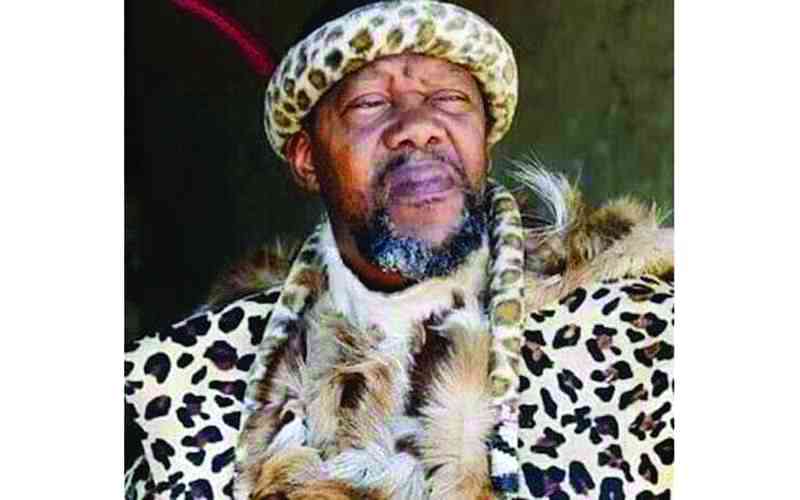
Former Ntabazinduna chief Nhlanhlayamangwe Ndiweni has waded into the raging storm resulting from a symbolic meeting between Bulawayo mayor David Coltart and Ndebele monarch King Bulelani Lobengula Khumalo.
The meeting has triggered a storm of controversy pitting cultural revivalists against the central government in a heated exchange over identity, legitimacy, and historical justice.
On April 21, Coltart hosted Khumalo at the mayoral parlour in what many Ndebele cultural activists hailed as a long-overdue recognition of the region’s royal legacy.
Local Government and Public Works minister Daniel Garwe swiftly condemned the move, labelling it “unlawful and wrongful,” and referred to Khumalo as a “pseudo character.”
Garwe invoked the constitution and the Traditional Leaders Act, arguing that only the president, with the advice of the provincial assembly of chiefs, can recognise traditional leaders.
He has since demanded an explanation from Coltart, but Ndiweni dismissed the government’s stance, insisting the Ndebele nation does not require state validation for its monarchy.
“We, the owners of that monarchy, the Ndebele nation, did not have to ask permission from the government of the day in order to have a monarch,” he said.
“That monarchy is ours.”
- Benzema confident Real will reach UCL final
- Ndiweni: I’m going nowhere
- Chief Ndiweni predicts overwhelming rigging in the by elections
- Outrage over school uniform prices
Keep Reading
Khumalo was enthroned in secret on September 28, 2018, in a ceremony shielded from state interference — a move that many felt was necessary given the political sensitivity surrounding traditional leadership structures in Matabeleland.
“Just because the enthronement was done in secret does not mean it is not proper,” Ndiweni said.
“Monarchies across the world — from Sadc to the United Kingdom — often begin with secret rituals before they are publicly announced.”
According to Ndiweni, Khumalo’s legitimacy has been recognised across the region and beyond.
He claimed the monarch is acknowledged by other African royal houses, the African Union, and even the United Nations — a bold assertion highlighting a deep-rooted grievance over cultural erasure and historical marginalisation.
The heart of the matter lies in the symbolic significance of Bulawayo itself.
“Bulawayo is the Royal City of the House of Khumalo. As such, that meeting had to occur,” Ndiwenisaid.
“I must applaud the sitting mayor, Coltart, for having the bravery and the courage to do such a thing.”
For Ndiweni and other cultural advocates, the meeting marks the beginning of a long-overdue reconnection between the city and its royal heritage — a relationship they hope to see formalised through devolution and cultural revival.
“With devolution, the relationship between the City of Bulawayo and the Royal House Khumalo will be formalised,” Ndiweni noted, suggesting that the city will eventually need to establish a permanent royal residence.
While the Zimbabwean constitution is clear on the appointment of traditional leaders, it remains silent on monarchies. Ndiweni pointed out that this silence is often misinterpreted.
“The Zimbabwean law does not prohibit a monarchy. There is not one sentence in the constitution that says you are not allowed a monarchy,” he said.
“This was confirmed during proceedings at the Bulawayo High Court.”
He criticised what he called a political rather than legal response from the ministry.
“We question its legitimacy. Everything about it indicates this was political correspondence, not a legal one,” he said, referring to the ministry’s letter to Coltart.
Beyond politics, Ndiweni sees the revival of the monarchy as a potential driver of economic growth, particularly through cultural tourism.
“Bulawayo has a huge amount to gain from this relationship,” he said.
“We are the only city in Zimbabwe that can authentically claim to be the City of Kings and Queens.”
He envisions future events like Inxwala and Mhlahlandlela drawing cultural tourists and strengthening community pride — all under the banner of a re-established Ndebele monarchy.
In addition, Ndiweni said “We are heading in the right direction. We must remain focused on the main issue — we have a reigning monarch, and he is beginning to re-engage with his ancestral home.”
Ndebele kingdom timeline
In 1893: The Ndebele kingdom was dismantled by British colonisers following the overthrow of King Lobengula.
In the 1980s: Efforts to revive Ndebele cultural institutions suffered during the Gukurahundi era, deepening mistrust between Matabeleland and the central government.
In 2018: King Bulelani Lobengula Khumalo was secretly enthroned in South Africa, sparking mixed reactions locally.
In 2023–2025: Tensions resurface over traditional leadership and cultural recognition amid increasing calls for devolution in Matabeleland.
On April 21, 2025: Coltart hosted Khumalo at Bulawayo City Hall, prompting government backlash and renewed cultural mobilisation.









